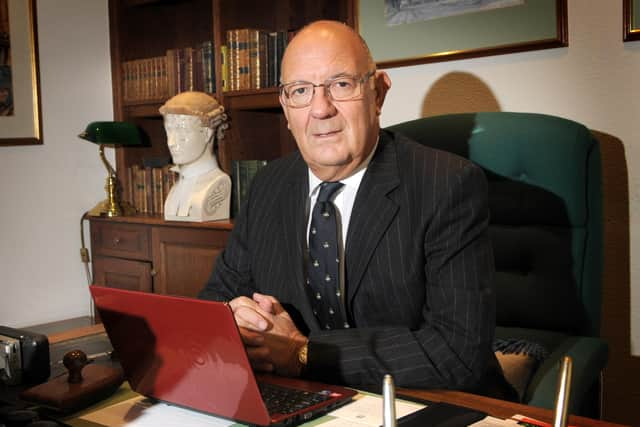Revamp of Northern Ireland rape cases risks innocent men being jailed, says top judge who examined false sex claims scandal


Sir Richard Henriques, who issued a scathing report into the Metropolitan Police’s failed £4.5m Operation Midland in which police believed a fantasist’s claims about a Wesminster paedophile sex ring, said that the current plan to re-write the rules around such offences risks more innocent people being put behind bars.
Sir Richard, a retired UK High Court judge, said that the proposed changes to the legal system – which were greeted with uncritical enthusiasm by many NI politicians when they were published last year – will be extremely costly.
Advertisement
Hide AdAdvertisement
Hide AdHe said the plans raise questions about why complainants in other kinds of criminal cases should not be entitled to the same special measures.


The planned changes were drawn up by retired NI judge Sir John Gillen in the wake of the acquittal of Paddy Jackson, Stuart Olding and their co-defendants in relation to a charge of rape in 2018.
His report (known as the Gillen report) was published in May 2019, and contains a whopping 253 changes to the system. They include:
The general public will be barred from sex trials;
No anonymity for people accused of sex crimes;


The appointment of publicly-funded lawyers to look after the interests of complainants (separate from the prosecution lawyers who already fight their cases in court);
Advertisement
Hide AdAdvertisement
Hide AdA focus upon providing juries with material to “combat rape myths” at the outset of trials and screening jurors for “signs of rape myths” before they are enrolled.
The Gillen report says the idea that false allegations are common is a “myth”. Sir John Gillen arrived at that conclusion saying “that there were only a very small number of individuals prosecuted for having made a false complaint”.
He also says the idea that allegations could be levelled out of revenge or because complainants regret having sex are also potential myths.


Reviewing the Gillen report, Sir Richard (whose wife had been a Victim Support volunteer counsellor) said most of its 253 recommendations do merit support.
Advertisement
Hide AdAdvertisement
Hide AdHe praised Sir John’s “considerable experience in the criminal courts and his profound understanding of the criminal justice process” and said what follows is “not intended as a criticism of Sir John’s admirable work”.
Nonetheless he voiced “reservations” over key aspects of the plans.
He said “the cost of implementing the proposals in their totality will be considerable and possibly prohibitive”.
In particular he cited new publicly-funded legal representation for complainants and re-training of lawyers as among the pricey areas.
Advertisement
Hide AdAdvertisement
Hide AdHe also said: “Enhanced provision for serious sexual offences may focus public attention on shortcomings of the criminal justice process in general and in particular, in cases of homicide, terrorism and serious violence. Why should serious sexual offences attract a more expensive and sophisticated process than other equally or more serious allegations?”
He added: “I oppose introduction of independent legal advisors pre-trial for complainants. Truthful complainants need no legal assistance whilst assistance given to those who make false allegations will only increase the chances of wrongful convictions...
“As presently formulated and presented [Sir John’s] system appears designed to increase the conviction rate with the unintended consequence of increasing the chances of the innocent being convicted.”
A “balancing factor” should be introduced to help neutralise the danger of wrongful convictions, said Sir Richard; namely, “material placed before the jury dealing with rape mythology, and videos, must convey the message that false allegations of rape are made for a variety of reasons”.
Advertisement
Hide AdAdvertisement
Hide AdSir Richard’s points were put to Sir John (who has denied his proposals are designed to simply increase the conviction rate).
He referred the paper to the Department of Justice, which said: “The Gillen Review was commissioned by the Criminal Justice Board to examine how the criminal justice system deals with cases of serious sexual assault and recommend improvements to deliver better outcomes and support for complainants.
“The Gillen Report was published following extensive consultation with victims groups, the legal profession and the public and has been identified as a priority of the NI Executive in the New Decade, New Approach agreement.
“The Department is working with partners to consider Sir John’s recommendations and co-ordinate implementation which will be subject to the scrutiny of the Justice Committee and NI Assembly as appropriate.”
WHO IS SIR RICHARD HENRIQUES?:
Sir Richard is today aged 76.
He became a barrister aged only 24.
Advertisement
Hide AdAdvertisement
Hide AdAs a prosecutor he oversaw the convictions of James Bulger’s killers, and serial killer Harold Shipman.
And as a judge he oversaw the prosecution of a gangmaster linked to deaths of 21 cocklepickers at Morcambe Bay.
He retired in 2013, but was called out of retirement to examine the Metropolitan Police’s handling of Operation of the disastrous Operation Midland into historic sex claims in 2016.
The result was a lengthy, detailed report which absolutely savaged The Met.
Advertisement
Hide AdAdvertisement
Hide AdIt found that officers were in thrall to a culture where the mantra “the victim should always be believed” was the guiding principle.
Among the cases he looked at was that of Carl Beech, a serial liar and paedophile, who was allowed to waste huge amounts of police time and money with fantastical rape claims which the police took at face value.
Sir Richard was at pains to stress that “false complaints are made from time to time, and should not be regarded as a remote possibility”.
He continued: “There is plain evidence, in the cases that I have reviewed, that an instruction to believe complainants has over-ridden a duty to investigate cases objectively and effectively.”
Advertisement
Hide AdAdvertisement
Hide AdSuch a stance “strikes at the very core of the criminal justice process” and “will generate miscarriages of justice”, he concluded.
SUPPORT FROM POLITICIANS, BUT WORRY AMONG LAWYERS:
Victim support advocates, feminist groups, the Alliance, SDLP and Sinn Fein reacted with immediate enthusiasm to the Gillen report when it came out last May.
Sinn Fein were so enthusiastic that the party called for all his recommendations to be adopted before they had even been published, while the SDLP issued a statement hailing the 714-page report containing 253-recommendations by 2pm on the day it was published.
The UUP meanwhile said it was “very supportive”, while the DUP’s Paul Givan said reform is needed but raised the possibility of “debate on anonymity for the accused”.
Advertisement
Hide AdAdvertisement
Hide AdThe Law Society (representing 3,000-or-so solicitors) disagreed with the Gillen recommendation of no anonymity for the accused.
And the Bar of NI (representing around 600 barristers) raised a litany of concerns around rape myths, pre-recorded testimony, barring the public, and more. READ MORE: Major concerns raised by lawyers over ideas to overhaul sex cases
The News Letter is effectively the sole media outlet in the UK to have covered these concerns, and those of other commentators.